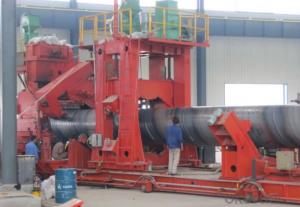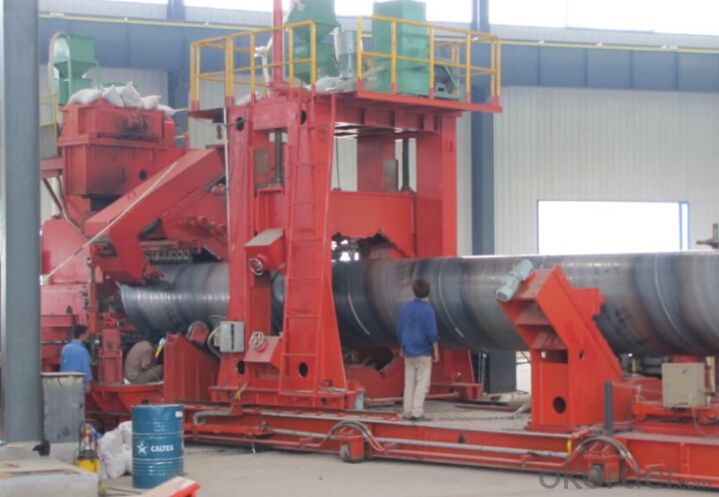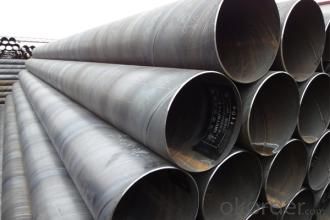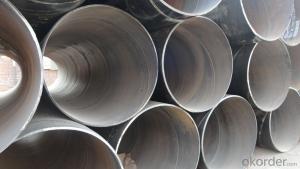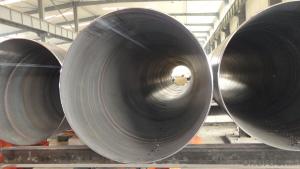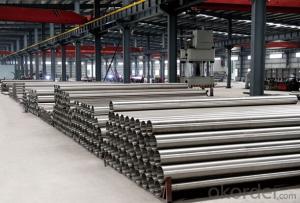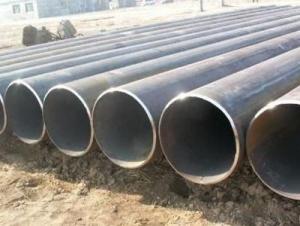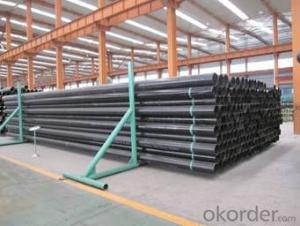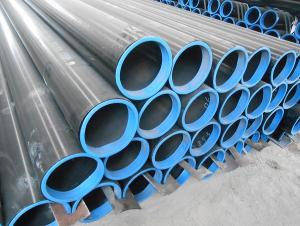SSAW Hot Rolled Steel Tubes
- Loading Port:
- China Main Port
- Payment Terms:
- TT or LC
- Min Order Qty:
- 100 m.t.
- Supply Capability:
- -
OKorder Service Pledge
OKorder Financial Service
You Might Also Like
Quick Details
| Thickness: | 6 - 28 mm | Section Shape: | Round | Outer Diameter: | 219 - 3500 mm |
Place of Origin: | Tianjin (Mainland) | Secondary Or Not: | Non-secondary | Application: | Oil Pipe |
| Technique: | SAW | Certification: | API | Surface Treatment: | as per your request,Black/Blue 3PE or as per your request |
Special Pipe: | API Pipe | Alloy Or Not: | Non-alloy | ||
| Certificate: | ISO 9001:2008, API, SGS, BV | Material: | Q235A/B,Q345,L360 and X42-X80 grade | Package: | In bulk or bundles |
| Usage: | structure pipe | Main market: | all over the world | Product name: | SSAW Spiral Steel Tube |
| End: | Beveled End |
FAQ of SSAW Hot Rolled Steel Tubes:
①How is the quality of your products?
Our products are manufactured strictly according to national and internaional standard, and we take a test on every pipe before delivered out. Guaranteed: If products’ quality don’t accord to discription as we give or the promise before you place order, we promise 100% refund.
②How about price?
Yes, we are factory and be able to give you lowest price below market one, and we have a policy that “ for saving time and absolutely honest business attitude, we quote as lowest as possible for any customer, and discount can be given according to quantity”,if you like bargain and factory price is not low enough as you think, just don’t waste your time.Please trust the quotation we would give you, it is professional one.
③Why should you chose us?
Chose happens because of quality, then price, We can give you both.Additionally, we can also offer professional products inquiry, products knowledge train(for agents), smooth goods delivery, exellent customer solution proposals.Our service formula: good quality+good price+good service=customer’s trust
SGS test is available, customer inspection before shipping is welcome, third party inspection is no problem.
SSAW Hot Rolled Steel Tubes Images:
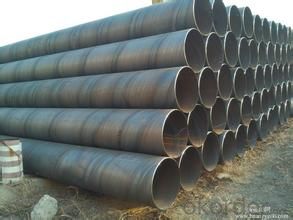
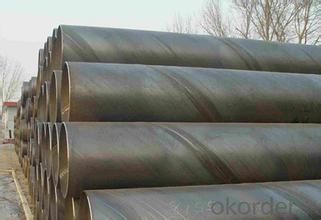
- Q: How do steel pipes handle extreme temperatures?
- Steel pipes are highly durable and can handle extreme temperatures due to their inherent strength and heat resistance. They have a high melting point, allowing them to withstand both very high and very low temperatures without compromising their structural integrity. Additionally, steel pipes have excellent thermal conductivity, which enables them to efficiently transfer heat and prevent damage caused by extreme temperature fluctuations.
- Q: How do you calculate the pipe volume flow rate for steel pipes?
- The pipe volume flow rate for steel pipes can be calculated using the formula: V = A * V_avg, where V is the volume flow rate, A is the cross-sectional area of the pipe, and V_avg is the average velocity of the fluid flowing through the pipe.
- Q: What is the difference between carbon steel and alloy steel pipes?
- The main difference between carbon steel and alloy steel pipes lies in their composition. Carbon steel pipes are primarily made from iron and carbon, while alloy steel pipes are made from iron, carbon, and other elements such as manganese, nickel, chromium, or molybdenum. Alloy steel pipes have enhanced mechanical properties and better resistance to corrosion, heat, and pressure compared to carbon steel pipes. Additionally, alloy steel pipes are typically used in more demanding applications where strength and durability are critical.
- Q: Are steel pipes affected by magnetic fields?
- Yes, steel pipes can be affected by magnetic fields. Steel is a ferromagnetic material, which means it is strongly attracted to magnets and can be magnetized. When exposed to a magnetic field, steel pipes can become magnetized, causing them to behave like magnets themselves. This magnetic effect can have several implications. First, if steel pipes are near strong magnetic fields, such as those generated by electrical currents or powerful magnets, they can experience a force that may cause them to move or vibrate. This can be problematic in certain applications, especially if the pipes need to remain stable and secure. Second, the presence of magnetic fields can induce electrical currents in steel pipes. These currents, known as eddy currents, can generate heat and energy losses. In some cases, this can lead to inefficiencies and increased energy consumption in systems that involve steel pipes. Lastly, magnetic fields can also affect the accuracy of magnetic measurement devices used to detect defects or corrosion in steel pipes. The presence of a magnetic field can interfere with the readings, making it more challenging to accurately assess the condition of the pipes. To mitigate these effects, various measures can be taken. For instance, in applications where stability is crucial, steel pipes can be shielded or isolated from strong magnetic fields using non-magnetic materials. Additionally, the impact of eddy currents can be minimized by using pipes with proper insulation or by using magnetic shielding techniques. Overall, while steel pipes are indeed affected by magnetic fields, the extent of the impact depends on factors such as the strength of the magnetic field, the composition of the steel, and the specific application or environment in which the pipes are used.
- Q: What are the different types of fittings used with steel pipes?
- There are several types of fittings used with steel pipes, including elbow fittings, tee fittings, coupling fittings, union fittings, and flange fittings.
- Q: Can steel pipes be used for desalination plants?
- Yes, steel pipes can be used for desalination plants. Steel pipes are commonly used in desalination plants to transport and distribute water, as they are durable, resistant to corrosion, and can handle high-pressure systems.
- Q: Can steel pipes be used for offshore applications?
- Yes, steel pipes can be used for offshore applications. Steel pipes are commonly used in offshore industries due to their durability, strength, and resistance to corrosion. Offshore applications such as oil and gas exploration, drilling, production, and transportation of fluids and gases often require the use of steel pipes. These pipes are designed to withstand harsh and corrosive environments found in offshore locations, including exposure to saltwater, extreme temperatures, and high pressure. Additionally, steel pipes can be manufactured to meet specific requirements for offshore projects, including size, thickness, and material grade, to ensure safety and reliability. Overall, steel pipes are a reliable and widely used choice for offshore applications.
- Q: How are steel pipes used in structural applications?
- Steel pipes are commonly used in structural applications due to their strength, durability, and versatility. They can be used as load-bearing members in buildings, bridges, and other structures to provide support and stability. Additionally, steel pipes can be easily fabricated and joined together, allowing for various configurations and designs. Their resistance to corrosion and ability to withstand high temperatures also make them suitable for applications in harsh environments. Overall, steel pipes play a crucial role in enhancing the structural integrity and longevity of various construction projects.
- Q: Steel pipe is particularly long, how to clean the inner wall of the pipe so that it can be thoroughly cleaned
- The urban water supply pipeline cleaning is a very necessary work, it can not only improve the transmission efficiency of pipeline to reduce energy consumption, but also to clear the pipeline dirt, remove two pollution, improve water quality, protect the people's physical and mental health.
- Q: What are the environmental impacts of steel pipe manufacturing?
- The environmental impacts of steel pipe manufacturing include the extraction of raw materials such as iron ore and coal, leading to habitat destruction and increased carbon emissions. The manufacturing process itself involves high energy consumption and releases greenhouse gases, contributing to climate change. Additionally, the disposal of waste materials and chemicals used during production can contaminate soil and water sources if not handled properly. Overall, steel pipe manufacturing has significant environmental implications that need to be addressed through sustainable practices and technologies.
Send your message to us
SSAW Hot Rolled Steel Tubes
- Loading Port:
- China Main Port
- Payment Terms:
- TT or LC
- Min Order Qty:
- 100 m.t.
- Supply Capability:
- -
OKorder Service Pledge
OKorder Financial Service
Similar products
Hot products
Hot Searches
Related keywords
